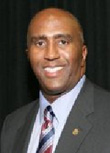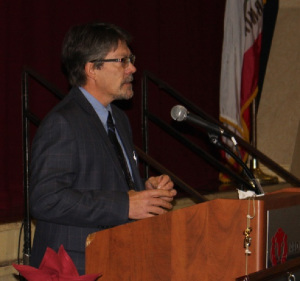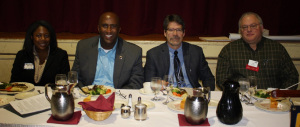 Assemblyman Jim Cooper was the guest speaker at our annual joint meeting with the Sacramento Chapter of APWA. The Assemblyman focused on infrastructure issues and noted a renewed interest in infrastructure investment as critical to our economic recovery.
Assemblyman Jim Cooper was the guest speaker at our annual joint meeting with the Sacramento Chapter of APWA. The Assemblyman focused on infrastructure issues and noted a renewed interest in infrastructure investment as critical to our economic recovery.
Deferred maintenance has resulted in an estimate of 16% of states highway lanes are in poor condition; an estimated $7.3 billion is needed annually to bring the states streets and roads up to safe standards.
A sustainable long-range transportation funding mechanism is critical to California’s powerful economic engine growth. Transportation funding relies heavily on gas taxes; raising the gas tax could temporarily bridge the funding gap. Increased use of environmentally sensitive electric, hybrid and alternative fuel vehicles reduces reliance on fuel and the associated funding source.
 The state is embarking on a pilot “Road Usage Charge” program as a potential replacement for the gas tax with findings expected in 2018. Assemblyman Cooper expressed reservations about the mechanism and will closely watch the Oregon program and the state’s pilot program.
The state is embarking on a pilot “Road Usage Charge” program as a potential replacement for the gas tax with findings expected in 2018. Assemblyman Cooper expressed reservations about the mechanism and will closely watch the Oregon program and the state’s pilot program.
Other options include earmarking revenue raised through higher annual vehicle registration fees, retail surcharges or tolling. Public private partnership and pay as you go are also considerations.
California water supply is confronted by one of the most severe droughts on record. The drought has impacted agriculture in Assemblyman Cooper’s district which produces $2.3 billion of ag products. He expressed the importance of preserving and reviving the Delta which is critical to the environment and economy of the Delta Region and the San Francisco Bay. He expressed support for water recycling and desalination for addressing the water supply issue.
 The $68 billion high speed rail project has the potential to have lasting economic benefits, employ many Californians and improve mobility through the state linking communities. He supports the project but believes the route should travel through more densely populated centers and additional accountability and streamlining is needed.
The $68 billion high speed rail project has the potential to have lasting economic benefits, employ many Californians and improve mobility through the state linking communities. He supports the project but believes the route should travel through more densely populated centers and additional accountability and streamlining is needed.
Assemblyman Cooper recognized the need for continued investment in intercity rail and bus systems, bike paths and walkways for economic benefits, to reduce reliance on oil and to provide environmental benefits.


